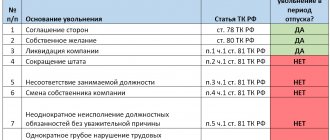The procedure for dismissal at will
If an employee needs to quit his job, he can do this at any time without giving reasons for his decision. And the employer has no right to interfere with this. But the employee must do this correctly so that problems do not arise later. Since not all employers say goodbye to their employees peacefully and quickly. Any dismissal consists of three main stages:
- Providing a written statement at work about your intention to quit.
- Work for fourteen days, which is counted from the moment the application is submitted.
- Obtaining a work book and cash payment.
Therefore, first of all, you need to write a letter of resignation, in which the employee indicates that he is doing this of his own free will. It is best not to give it to the employer, but to take it yourself to the HR department. Moreover, such a statement should be written in two copies and each of them should bear the stamp, date and signature of the person who accepted it. Or you can simply make a copy of the application, but in this case, the HR department must also put an acceptance mark on it.
There are situations when it is not possible to deliver the application yourself, or they simply do not want to accept it, in this case you can proceed as follows:
- Send the application by mail and do it by registered mail with acknowledgment of receipt and a list of the contents. In this case, the employee will have a receipt confirming the sending of the letter and a signed postal notification.
- Send a telegram with acknowledgment of delivery.
- Submit an application through a notary.
In these cases, two weeks of work must be counted not from the moment the application was submitted, but from the time it reached the addressee.
But even after the employee has submitted an application and worked for two weeks, there are cases when the director does not fire him of his own free will. If you cannot quit peacefully, then you need to resort to extreme measures.
Term
Compliance with legal deadlines is one of the main points in terminating a contract, since the legislator strictly outlines the days that the employee must work, and after which all monetary compensation must be transferred to the financial account of the dismissed person.
So, according to the general rule, the employee undertakes to provide the company administration with a statement of his desire to terminate the contract at least 14 days before his final departure. The specified period of time may be longer due to special circumstances. In particular, this does not apply to personal delivery of a petition to terminate an employment agreement, but to sending it to the employer by mail. In this case, the countdown of the two-week period will begin on the next day after the manager receives the letter. Also, in order to avoid inaccuracies and possible disputes, it is necessary to indicate in the application not a specific date, but a legal fact after which the agreement will be terminated.
Important! Internal documents may establish a different notice period for the employee about dismissal. But a person is warned about this during employment, and this is also directly stated in the contract.
An exception to this rule is situations when the employee desires to terminate the employment agreement during the probationary period. In this case, the employer's notice must be complied with three days before the final termination of the agreement.
Help from the labor inspectorate
Very often people are lost and do not know what to do if they are not fired of their own free will. In such a situation, you need to know that the employer or director does not have the right to prevent the dismissal of an employee, since he has no legal grounds for this. In Art. 80 of the Labor Code of the Russian Federation states that after the expiration of the worked period after filing an application, the employee has the right to no longer appear at the workplace.
If on the last working day the last payment was not made to the employee, he was not given a work book and he was refused voluntary dismissal, then in this case you should contact the labor inspectorate. There you will need to write an application and provide all the necessary documents. After this, the body will review the case within a month and bring the organization that violates labor laws to administrative liability.
Upon receipt of an application, the labor inspectorate has the right to conduct an inspection of the organization and issue instructions to the employer that he must comply with. These include the return of the employee’s work book.
In case of failure to comply with all instructions, sanctions will be imposed on the violator. That is why, usually, the employer immediately settles the employee peacefully with the organization if he is intimidated by the labor inspectorate.
Go on sick leave after dismissal
If you have not yet found a new job within 30 days after your dismissal and you become ill or injured, you can issue a sick leave certificate and send it to your previous employer. He must pay it. This is guaranteed by Article 5 of the Federal Law “On compulsory social insurance in case of temporary disability and in connection with maternity.”
How to do this: you need to bring your sick leave certificate to your former employer.
Read on topic: 10 things employers are silent about
An employee's appeal to court
According to the law, an employer does not have the right to refuse to dismiss an employee at his own request. If this happens, the employee can go to court. In this case, documents that confirm that an application for dismissal was submitted, and the working period has already passed, will come in handy. But it is best not to delay this and file a claim within three months. Since the statute of limitations for labor disputes is just such a period (in accordance with Article 392 of the Labor Code of the Russian Federation).
After all, if an employer does not issue a work book to a former employee, then in this way he deprives the person of the right to work and gives grounds to bring himself to administrative responsibility.
The employee, in turn, has the right not only to file a claim against his director and the organization, but also to demand compensation for moral damage caused to him and for the untimely return of his work book.
The amount of compensation is calculated based on the employee’s average earnings and a percentage is collected that corresponds to the number of days of delay.
How to stop illegal dismissal during a pandemic: a lawyer explains
Situation. The employer insists on your dismissal of your own free will
«When your boss asks you to write such a statement, most likely the employer wants to get rid of you with little loss. If an employee writes such a statement, then in addition to losing his job, he is deprived of a number of labor guarantees: for example, severance pay, which is paid upon dismissal in connection with the liquidation of the organization or reduction in the number or staff of the organization’s employees. It is also deprivation of the opportunity to register with the employment service as an unemployed person with the possibility of receiving appropriate benefits with an offer of work options,” explains the legal adviser.
What can be done? If you really want this job and are holding on to it, refuse to write an application or don't write one. There is a significant difference between these two formulations. In the first case, you were offered to write - you refused. In another case, no one offered you one - you wrote the application yourself under the influence of the employer’s hidden repressive actions towards you, which are often formally within the law. This is called forced resignation.
If “you were offered to write, but you refused,” then wait for further developments.
- By refusing to write a letter of resignation of your own free will (if you managed to get your bearings during the conversation) or soon after that, warn the employer about the illegality of his demands. And also that you plan to apply for protection of your rights to the labor inspectorate, to the trade union (if the employee is a member of the trade union) or to the court. This can scare the employer and stop them from trying to fire you in the future.
- Keep hidden audio and video recordings of all your conversations with employer representatives. This way you will accumulate an evidence base. Courts accept such records as evidence of illegal dismissal.
- If there are employees who are witnesses to your conversation with the employer with a proposal to quit, find out from these persons the degree of their readiness to confirm this fact in the labor inspectorate or court. Despite the seeming fantastic nature of such consent on the part of colleagues, as practice shows, situations are different, since it is quite possible that the employee himself was subjected to discriminatory actions on the part of the employer.
- Try to communicate with other employees to find out whether any of them have been offered to resign of their own free will. Believe me, the collective appeal of workers in defense of their rights has a much more significant effect. In addition, this appeal can be sent to the prosecutor’s office, which will also enhance the positive outcome of your proceedings with the employer.
- Ask for certified copies of all your work documents from your personal file, including incentives, certificates of appreciation, successfully completed certifications for the position held, and so on. Any material signed and sealed by the employer that positively characterizes you as a conscientious, disciplined, qualified employee will only strengthen your position and will not allow you to easily dismiss at the initiative of the employer on discreditable grounds.
- Ask the employer to put in writing any comments and complaints about your work, scan them, and also save written instructions that are given to you for execution. Always respond to claims with a memo or explanatory note, attaching documents confirming your position, and hand them over to the employer against signature upon receipt on a copy (preferably with registration as incoming correspondence).
- If you are given instructions with unreasonable deadlines, taking into account the volume, or not related to your job function at all, ask that these instructions be given in writing or in the form of an order. Be sure to answer them reasonably and with reasoning with a memo stating the impossibility of execution. This will also help stop arbitrariness on the part of the employer.
- Remember, your actions should be more proactive, not wait-and-see. First of all, they should be aimed at suppressing illegal actions of the employer.
“Any, even formal, violations of your labor rights must have a response in the form of written appeals to the employer with the employer registering your appeals and receiving a written response from him. After receiving the answer, make a decision to appeal it to the labor inspectorate. If you do not want to aggravate the situation with the employer, but just want to indicate your determination, use the online resource “Labor Inspectorate”, where you can create an electronic appeal (it cannot be anonymous), and choose the option of considering the appeal without conducting an inspection of the employer by the labor inspectorate inspections,” says Ruslan Nurmukhamedov.
In this case, you will receive an official answer to your question from the labor inspectorate, but without negative legal consequences for the employer, which will leave carte blanche to assert your rights without applying sanctions:
- If you are subject to disciplinary action, be sure to appeal this decision to the labor inspectorate.
- Contact the trade union (if you are a trade union member) of your organization for protection of violated labor rights. Read the charter of the trade union organization. As a rule, free legal services are provided there, including when representing your interests in the labor inspectorate and court, as well as during negotiations with the employer.
- If your employer calls you to sign any documents or conduct negotiations, if possible, have your representative - a lawyer or attorney - present. This will ensure that any procedures are carried out legally.
If you nevertheless wrote an application of your own free will
Remember: you can withdraw such an application at any time before the expiration of the work period, unless another employee is invited in writing to take your place, who, according to labor law, cannot be denied an employment contract.
If, nevertheless, you were forcedly fired, at your own request or on the initiative of the employer, be sure to appeal such dismissal in court.
If you adhere to these recommendations, then the chances of your dismissal being declared illegal and reinstated at work with compensation for loss of earnings for the time that you were unable to work increase by multiples.
Reasons for refusing dismissal
Employers do not want to fire at will due to a number of reasons:
- highly qualified employee;
- A big waste of time looking for a new employee.
Sometimes, when managers do not allow you to quit, you can try to come to an agreement with them:
- specifically explain the reason for leaving;
- try to select a qualified replacement employee yourself;
- agree to stay a little longer.
Legal basis
Not only the Constitution of the state enshrines the free opportunity of citizens of the state to choose the place where work is performed, as well as to terminate existing labor relations.
This issue is regulated in more detail by the country’s Labor Code, which establishes the procedure and rules for terminating a contract at the initiative of an employee. In addition, departmental acts have been developed that regulate the procedure and sequence of termination of an employment agreement. But the general rules may differ slightly, depending on the specifics of the production organization. For example, the algorithm for terminating a contract with the military will be slightly different than terminating a contract with civilian employees.
Other conditions
Not infrequently, the administration of a company, in order to retain an employee, tries to increase the volume of a person’s official duties, believing that if during the working period the employee cannot cope with the entire volume of cases, then he can continue to be involved in work until all tasks are resolved. This is wrong. Additional job responsibilities are not a reason to extend work against the employee’s will.
But the employee must also understand that while the work period lasts, he is obliged to fully and efficiently fulfill his duties. Otherwise, disciplinary measures may be applied to him. Particularly malicious violations may cause termination of the contract not at the initiative of the employee, but due to a violation of discipline.
Penalties
- Calculation of compensation for unused vacation upon dismissal
If the manager is proven guilty of unlawfully obstructing dismissal, failure to issue required documentation and full payment to the employee, the manager may be held accountable by paying an amount equal to the salary for the period of time while he had the documentation and a fine of 20 thousand rubles.
Does the employer have the right to refuse to consent to dismissal?
In a situation where the boss happily signed the resignation letter, there is also little good, but if the picture is the opposite, there are no less unpleasant moments.
Does the employer have the right not to endorse such an employee’s request? Let us specify the question: does he have the right not to let go “on his own” - no. We do not have serfdom, and detaining a worker means violating not only the Labor Code of the Russian Federation, but also the Constitution, according to which labor is free.
On the other hand, if the boss does not sign the resignation letter, this does not change anything: Article 80 of the Labor Code of the Russian Federation states that the employee is obliged to notify the employer in writing about his decision. There is no mandatory visa requirement. From the next day after receipt of the application, the countdown of 14 days begins, after which the employee has the right to stop working. On the last day they are required to issue him a work book and make a payment.
The employer has the right to let the employee go without two weeks of work. But sometimes he is obliged to do this from the date specified by the employee - if it is impossible to continue to perform duties due to a change of residence, retirement, the need to care for a child, admission to an educational institution, due to violation of labor laws by the employer, etc. d. If serious (documented) reasons are presented, but they do not sign an application for voluntary dismissal earlier than two weeks later, this is illegal.
IMPORTANT!
All this applies to an open-ended employment contract. Urgent expires upon expiration of its validity period, unless there are some insurmountable circumstances.
Another aspect: the Labor Code of the Russian Federation talks about two weeks (14 calendar days) as a notice period; no additional conditions are specified, that is, whether they were on vacation or sick leave does not matter.
On the other hand, who should you go to to sign a letter of resignation if your boss is sick or on vacation - a human resources specialist or another employee who is assigned the appropriate responsibilities in the organization. Let us repeat: we are talking about notification, not agreement.
ConsultantPlus experts examined how it is possible to confirm the fact that the employer was warned about the upcoming dismissal of the employee at his own request if he does not sign the resignation letter. Use these instructions for free.
Working off
The legislator establishes the need for a resigning employee to continue performing his official duties for another two weeks. This period is provided so that the employer can find a new employee to fill the vacancy. In addition, during this period of time, the administration of the enterprise prepares documents for dismissal, and also prepares a full package of financial payments.
Within the specified two weeks, the employee himself must prepare all the files for delivery, draw up a list of documents to be handed over to management, and also hand over to the enterprise all the material and technical goods that were allocated to the employee on temporary use rights. Also at this time, interns may be hired to work, who will be trained by a still employed employee.
What threatens the director?
There is no need for a director's visa, and if the director does not sign the resignation letter, this is not a problem.
The problem is if there is no corresponding order on time, and on its basis there is no calculation. This is the basis for a complaint to the Labor Inspectorate, prosecutor's office or court.
If the violation is confirmed, the employer faces at least a fine (Article 5.27 of the Administrative Code); if the money due to a former employee has not been paid (or not paid in full) for two or more months, this is grounds for initiating a criminal case under Art. 145.1 of the Criminal Code of the Russian Federation.
If the procedure for terminating the employment relationship itself was carried out in violation of the law, the employee has the right to go to court.
Recommendations for dismissal
If the employer does not want to meet you, you should not do the following:
- When you hear that the employer does not want to sign a letter of resignation, you do not need to become hysterical and tell your boss everything you think about him. This will not help matters, but it may aggravate the situation and become a reason for the imposition of penalties for disrespect for superiors and subsequent dismissal under some disciplinary clause;
- It is strongly recommended not to show passive aggression: after hearing a refusal to sign a statement, silently leave the place of work without working off;
- Instead, you should draw up a resignation letter in two copies and submit both copies to the secretary of the company where you work for registration. Make sure that both applications are marked with the time, day, month and year of receipt, the signature of the secretary and a note on acceptance of the document in the appropriate journal of the enterprise;
- After this, receive one copy with all the necessary marks and begin the required work (as a rule, it is two weeks);
- After a two-week period (fourteen days) has passed, you can calmly pack your things and leave work, demanding the return of: a work certificate with a mark, a certificate of income for the last year (if the work period is shorter, then for the period of work), an employment contract/order about dismissal (if necessary);
- In addition, it is important to request a calculation of the wages that you have already worked;
Salary payments must be made either on the last working day before dismissal or on the next day. Not later! Next, penalties will begin to accrue.
Please keep in mind that when calculating final payments the following must be taken into account:
- Salary for all working days worked during the month of dismissal;
- Financial compensation for unused vacation days;
- Bonuses that are awarded to employees of an enterprise when performing certain job duties;
Even if it is customary to pay them later (but they are due to employees of your position), you have the right to receive a bonus even in the event of voluntary dismissal.
- Social benefits provided for by the company’s policy and the current norms of Russian legislation;
Read more about payments upon dismissal at your own request here.
If you have disagreements regarding the amount of final payments (as a rule, they pay less than they should), you can try to resolve the issue pre-trial (with the chief accountant or employer), through the labor inspectorate. The last resort is court.









